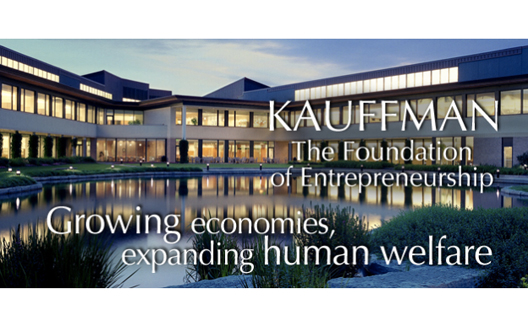The Story of Kauffman Foundation's Support for Entrepreneurship: A Chat with Thom Ruhe

 In the Middle East, we’ve all heard the
arguments for entrepreneurship’s economic impact, especially its
potential to alleviate rising unemployment. Research on the impact
of entrepreneurs and the challenges they face, however, is hard to
find. That’s a gap that we at Wamda will be working to fill, in our
Wamda Research Lab. As we do so, we’ll be drawing some inspiration
from the work of the Ewing Marion
Kauffman Foundation, one of the leading global institutions
supporting entrepreneurship today.
In the Middle East, we’ve all heard the
arguments for entrepreneurship’s economic impact, especially its
potential to alleviate rising unemployment. Research on the impact
of entrepreneurs and the challenges they face, however, is hard to
find. That’s a gap that we at Wamda will be working to fill, in our
Wamda Research Lab. As we do so, we’ll be drawing some inspiration
from the work of the Ewing Marion
Kauffman Foundation, one of the leading global institutions
supporting entrepreneurship today.
Kauffman Foundation is known for many things, including supporting
Startup Weekend and Global Entrepreneurship Week, which have
sprouted startup events all over the globe. Kauffman Foundation is
also famous for its
research revealing that the average age of U.S. technology
company founders is 39- older than many would assume, given that
prominent figures Bill Gates, Steve Jobs, Larry Page, Sergey Brin,
and Mark Zuckerberg all became founders in their early to mid
20s.
We recently sat down with Thom Ruhe, the Vice
President of Entrepreneurship at Kauffman Foundation, to discuss
how data, education, and angel investment work to support
entrepreneurs. Here are his thoughts:
How has Kauffman worked to support entrepreneurs?
We are the only foundation in the world that is
committed at this level to researching entrepreneurship on micro
and macro-economic levels, to assess its ability to grow
employment, commercialize intellectual property, and catalyze
economic growth. We’re trying to demystify the topic so that
policymakers and support organizations can have an informed debate,
and determine priorities.
What is the best way to support an ecosystem?
Another sector that will be a priority over the next
year or two is education. We've audited the entrepreneurship
education landscape, and we're trying to fill the gaps, both by
funding useful programs and creating our own. Our goal is to
catalyze nuts and bolts entrepreneurship, not necessarily the
Facebooks and Microsofts of the world, as there are many
resources targeted at high-growth firms, but the underserved
smaller companies that are still employing people, creating wealth
for the founders, and building economic opportunities for
employees.
Often in the Middle East, Startup Weekend and Global
Entrepreneurship Week attract people that self-identify as an
entrepreneur. How do you reach entrepreneurs in sectors like
construction or food and beverage, where founders don't necessarily
gravitate towards startup communities?
In my experience, the diversity at these events varies
from country to country, but again, to be inclusive, we focus on
education. If we have a curriculum or an educational program that
can solve an issue that these entrepreneurs need at that moment,
then we can start a dialogue with them. We also try to be very
visible in policy sectors to have a broad impact.
What are some of the most surprising conclusions that
you've seen come out of Kauffman's research?
The fact that the average age of an entrepreneur in
the U.S. is around 40 is at the top of the list. Another equally
interesting statistic is that the age group of 55 is the most
active in starting new companies. We’re not sure yet if that's due
to second career aspirations, early retirement, or income loss from
other sources, but we'll be watching that segment with great
interest.
We’ll also be boosting low tech ventures- which impact the economy
as much as any other demographic- by building a very practical
curriculum. These entrepreneurs don't need yet another Lean
Business Startup talk or lecture on Minimum Viable Product. Not to
denigrate that approach, but we’ll be starting with topics on "What
to Look for in an Angel," or "How to use Crowdfunding,” and let
global communities localize the courses.
One of the biggest challenges in this region is opening up
sources of early stage angel funding. How does Kauffman view that
space and how does it work to educate investors?
To spur the organized angel community, we created the
Angel Capital Association and the Angel Research Institute.
We’ve identified a tremendous untapped potential in individual
angel activity, among those who have enough net worth to invest
$100,000, $200,000, or $300,000 a year. To encourage these
investors, we’ll be launching a course called "The Power of Angel
Investing,” and bringing it online.
What do you love the most about what you do?
It's pretty simple- I love entrepreneurship, but more
importantly, I really enjoy the company of entrepreneurs. I'm also
a serial entrepreneur, and next to having my kids, the most
positive experience I had as an entrepreneur was seeing job growth
in my firms.
My last company today employs over 150 people. In its early days,
I'd come back from a sales call, and I'd count the cars in the
parking lot, because I knew that behind every vehicle, there was a
mortgage being paid, kids being fed and going to school, and people
being provided for. I know that sounds corny, but I took that
responsibility very seriously.
Now, at Kauffman Foundation, I have a platform to take something
that I have a passion for assist it on a global scale. How can you
not love that!?

